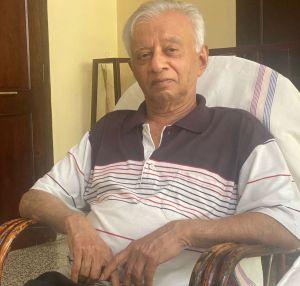'Another term for the government under the prime minister would likely be a step forward on the path to Hindu Rashtra.'
'No question of going back or any slowing down.'

Retired IAS officer, 85-year-old Thottuvelil Krishna Pillai Ayappan Nair has the unique distinction of having served in the prime minister offices of Inder Kumar Gujral, Atal Bihari Vajpayee and Dr Manmohan Singh.
Mr Nair was principal secretary and advisor to Dr Singh, with the rank of minister of state.
He joined the Punjab cadre of the Indian Administrative Service in 1963, served as the state's chief secretary before being assigned to the Centre as a secretary, Government of India in different capacities.
Rediff.com's Shobha Warrier met Mr Nair at his residence in Thiruvananthapuram and spoke to him about the prime ministers he had served and, of course, Prime Minister Narendra Damodardas Modi.
Part two of a multi-part interview:
- Part 1 of the Interview: 'You can't compare Modi and Dr Singh'
Another criticism against this government is that it doesn't acknowledge or accept the plurality of this country unlike the ideology followed the Congress party till now.
This government follows the one nation, one culture, or Hindi, Hindu, Hindustan idea....
Large sections of people share these concerns.
The perception of those who are not ardent supporters of the current regime is that the government is guided by Hindutva ideology.
This perception is mostly based on what the media reports project practically every day.
Some of the statements coming out of some BJP leaders also lend credence to the perception.
Is it only a perception? Are they not pursuing the Hindutva agenda?
Some of the steps taken by the government do give the clear impression that it is pursuing the Hindutva agenda as it is commonly understood and interpreted specially against the background of the recent widely celebrated consecration of the Sree Ram temple.
Mixing religion and politics has become a winning strategy in electoral politics.

Do you feel if Modi were to come back to power in 2024, they will try to make India a Hindu Rashtra?
According to present indications, another term for the government under the prime minister would likely be a step forward on the path to Hindu Rashtra. No question of going back or any slowing down.
The minority communities feel nervous about the way India is moving, and feel alienated...
Yes, whatever be the justification or provocations, large sections of the minority community are feeling highly concerned, and I don't blame them for that.
First of all, let us understand that India is a country where nearly 80% of the people are in one way or the other Hindus.
The perception of the minorities has to be seen against this reality and the reported instances of their ill treatment in different parts of the country and the Hindutva rhetoric.
You were there when Vajpayee was the prime minister. How different was the ideology pursued by Vajpayee and Narendra Modi?
Well, I mentioned in the beginning that there is no comparison between Manmohan Singh and Modi.
Similarly, in spite of their common RSS background, Vajpayee and Modi are poles apart.
Vajpayee was more of a consummate consensus builder. He was a gentleman politician in the mould of a Manmohan Singh or a Nehru.

Nehru used to say that minorities should never feel alienated...
Yes, Nehru said that about the minority communities, and now he is being accused of minority appeasement.
Manmohan Singh also felt the same way not only about minorities but about the state governments run by non-Congress parties.
He used to repeatedly remind us around him to be most helpful to Opposition party governments in states, and ensure that their concerns are duly addressed.
He was very particular about Government of India being fair and equitable.
 IMAGE: T K A Nair
IMAGE: T K A NairBut today, all the non-BJP ruled states feel totally neglected...
Yes, regrettably and I feel very concerned about the recent developments in Centre-State relations.
The relationship between the governor and the chief minister has deteriorated so badly in some states that they do not even look at each other.
The impression that Raj Bhavans are used by the central government to pursue its own chosen agenda of governance is gaining ground.
Opposition ruled states feel discriminated against.
The Constitutionally ordained federal polity is under severe stress and strain.
States like Kerala and Tamil Nadu have come out openly against their governors and gone to court which is a matter of serious concern.
Good governance and welfare of the people suffer in the process.
It is high time the Government of India stepped in to ensure the smooth functioning of State Governments under the provisions of the constitution.
Dormant institutional mechanisms for facilitating smooth Centre-State relations can be revived for the purpose.
- Part 3 of the Interview: 'You need not just one strong leader, you need a strong Opposition'
Feature Presentation: Aslam Hunani/Rediff.com










